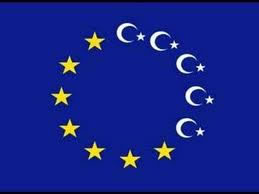
"Eurabia" - Is Today's Europe already a 'Land of Islam' according to Islam's definitions? Wishful thinking from Islamist website onIslam.
This article is a re-examination of the concept of ‘land of Islam’ in the fiqh (understanding) of the classic schools of the Islamic jurisprudence. The objective is to understand the criteria that jurists use for defining a certain land to be a ‘Land of Islam’.
The study reveals that neither Muslims being a majority, nor the application of the corporal part of the Islamic criminal law (hudud), is a valid criterion.
The study also reveals that the fundamental criteria used in the Islamic jurisprudence have to do with security (al-amn), freedom to practice the Islamic acts of worship (sh`a'ir al-islam), and justice (al-`adl).
Thus, although a comprehensive and realistic survey/index is required, a rough assessment of how European countries in general fare on the surveyed criteria gives them a relatively high score on the ‘Land of Islam’ scale.
One of the main concepts that shape Muslim minorities’ worldview is the concept of ‘Muslim countries’, or in other expressions, the ‘Islamic World’, or the ‘Land of Islam’. This concept has a strong impact on the ‘contextualisation’ of Muslims in the west in general and Europe in particular.
First, because some Muslims perceive that they live in a ‘non-Muslim’ or ‘disbelieving’ land, they give themselves a special status of an exceptional case, in which they think that the principles of justice and honesty do not apply to their dealings in these countries.
Some other Muslims, including some who are European to the roots and to the core, always yearn to live in the ‘Land of Islam’. A few of them venture to immigrate or relocate to that land, only to face an unexpected and sometimes shocking reality.
Moreover, and quite unfortunately, a few but loud groups of Muslims take the view that because they do not live in the ‘Land of Islam’, therefore they live in the ‘Land of War’. Bad politics and clash-of-civilizations advocates, also quite unfortunately, give these groups additional justifications to commit crimes –in the name of Islam– against the land they live in and their fellow citizens, and thus, add fuel to an already vicious cycle.
Last but not least, a feeling that a European Muslim does not live in his or her ‘natural’ and ‘default’ Land of Islam goes against their other feelings of belonging and identification. This conflict has serious implications on a number of issues, from politics and education to community participation and citizenship.
This article is examining the concept of ‘land of Islam’ in various Islamic classic schools of law. The objective is to understand whether this concept is an absolute concept that is defined via certain geographical borders, or it is, rather, a concept that is relative to certain values and conditions.
